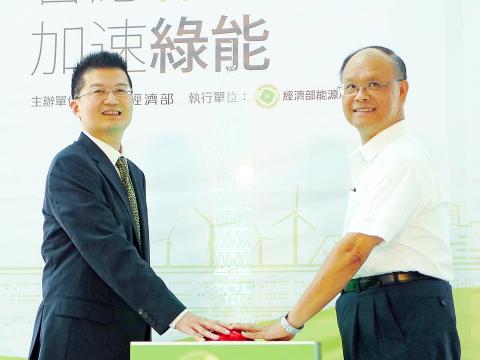Taipei Financial Center Corp (TFCC, 台北金融大樓公司), which operates the Taipei 101 skyscraper, yesterday said it plans to spend between NT$50 million and NT$60 million (US$1.6 million and US$1.9 million) to replace all the traditional fluorescent tubes on the skyscraper’s external walls to LED lighting in the next three years as part of its efforts to conserve energy.
The company’s remarks came after purchasing 1.01 million kilowatt-hours (kWh) of “green” power — which cost NT$1.07 million more than traditional power sources — from state-run Taiwan Power Co (Taipower, 台電) in April, increasing the consumption of energy generated from renewable resources.
“Taipei 101 will not always be the tallest green building in the world, but we are trying to become the paragon for global green buildings,” Taipei 101 president Chou Te-yu (周德宇) told a press conference, referring to the firm’s pledge to conserve energy and reduce carbon dioxide emissions.

Photo: CNA
Chou said the purchase of 1.01 million kWh of green power would meet the electricity demand for the lighting of the skyscraper’s external walls for one year.
Apart from the purchase of green power and the planned replacement using LED lighting, the company is considering increasing the number of solar panels installed, Taipei 101 spokesperson Michael Liu (劉家豪) said.
Last week, Taiwan Semiconductor Manufacturing Co (台積電) said it would buy 100 million kWh of green power, accounting for almost 13 percent of what Taipower could offer this year, while I-Mei Foods Co (義美) said it would purchase 2.5 million kWh of green power.
The amount of green power that had been purchased by enterprises and individuals totaled 119 million kWh in the first half of this year, up 27 times from the same period of time last year, Minister of Economic Affairs John Deng (鄧振中) said.
Deng said that the purchase of 119 million kWh of green power is expected to reduce nearly 60 million kilograms of carbon footprint, equivalent to the carbon absorbed by 6 million trees in one year.
In an attempt to encourage more enterprises and individuals to buy electricity generated from renewable resources, Deng said the government reduced the green power price to NT$1.06 per kWh from last year’s NT$2.64 per kWh.
Deng said the government plans to increase power contribution from renewable energy resources from this year’s 11.6 percent to more than 25 percent by 2030 to diversify the nation’s energy resources and contain the rising risk of power shortages.

In Italy’s storied gold-making hubs, jewelers are reworking their designs to trim gold content as they race to blunt the effect of record prices and appeal to shoppers watching their budgets. Gold prices hit a record high on Thursday, surging near US$5,600 an ounce, more than double a year ago as geopolitical concerns and jitters over trade pushed investors toward the safe-haven asset. The rally is putting undue pressure on small artisans as they face mounting demands from customers, including international brands, to produce cheaper items, from signature pieces to wedding rings, according to interviews with four independent jewelers in Italy’s main

Japanese Prime Minister Sanae Takaichi has talked up the benefits of a weaker yen in a campaign speech, adopting a tone at odds with her finance ministry, which has refused to rule out any options to counter excessive foreign exchange volatility. Takaichi later softened her stance, saying she did not have a preference for the yen’s direction. “People say the weak yen is bad right now, but for export industries, it’s a major opportunity,” Takaichi said on Saturday at a rally for Liberal Democratic Party candidate Daishiro Yamagiwa in Kanagawa Prefecture ahead of a snap election on Sunday. “Whether it’s selling food or

CONCERNS: Tech companies investing in AI businesses that purchase their products have raised questions among investors that they are artificially propping up demand Nvidia Corp chief executive officer Jensen Huang (黃仁勳) on Saturday said that the company would be participating in OpenAI’s latest funding round, describing it as potentially “the largest investment we’ve ever made.” “We will invest a great deal of money,” Huang told reporters while visiting Taipei. “I believe in OpenAI. The work that they do is incredible. They’re one of the most consequential companies of our time.” Huang did not say exactly how much Nvidia might contribute, but described the investment as “huge.” “Let Sam announce how much he’s going to raise — it’s for him to decide,” Huang said, referring to OpenAI

The global server market is expected to grow 12.8 percent annually this year, with artificial intelligence (AI) servers projected to account for 16.5 percent, driven by continued investment in AI infrastructure by major cloud service providers (CSPs), market researcher TrendForce Corp (集邦科技) said yesterday. Global AI server shipments this year are expected to increase 28 percent year-on-year to more than 2.7 million units, driven by sustained demand from CSPs and government sovereign cloud projects, TrendForce analyst Frank Kung (龔明德) told the Taipei Times. Demand for GPU-based AI servers, including Nvidia Corp’s GB and Vera Rubin rack systems, is expected to remain high,